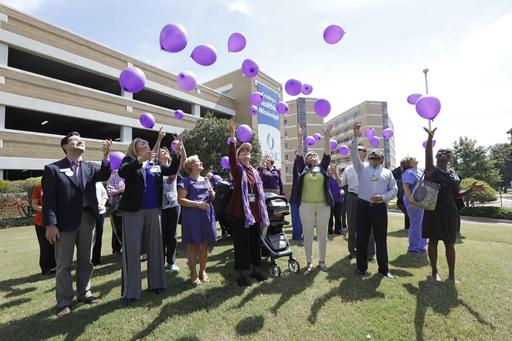Alzheimer’s Awareness Month

Over 100 balloons bearing names of loved ones living with Alzheimer’s disease or any form of dementia are released by family members, friends or staff at the University of Mississippi Medical Center in Jackson, Miss., in recognition of World Alzheimers Day, Wednesday, Sept. 21, 2016. The medical school partnered with several other Alzheimer and dementia support groups statewide to “paint it purple” event, a state exclusive event of releasing purple biodegradable balloons. (AP Photo/Rogelio V. Solis)
As a five year old in 2007, you do not fully understand what your dad means when he says “grandpa is very sick.” You believe that it is simply a common cold and all your grandpa needs is medicine. What I did not know at the time was that he was diagnosed with Alzheimer’s disease. Grandpa would never be back to his normal self. The future memories I would have of him would be forever tainted by an evil disease with no cure.
Alzheimer’s disease is the most common type of dementia, which is the loss of memory and cognitive abilities. It is a progressive disease, meaning that it worsens over time until the person can no longer complete daily tasks. As I grew older, I witnessed my grandpa’s condition worsen. He was confined to a wheelchair and needed my grandma’s help with everything. Eventually he lost his ability to talk. The opportunity to have a conversation with him was lost. The only way to know my grandpa was through the words of my family members, not through my own experiences.
My mother always told me as a child that I should pray for the sick. I remember one point in my childhood where I would pray every night for my grandpa to get better. I truly believed that if I prayed hard enough and placed all my faith in God, my grandpa’s disease would disappear. I did not realize that this disease was not something I could just pray away. It would not work itself out. Over the years, I would sometimes wishfully hope that as I stared into my grandpa’s eyes, he would remember who I was. Just because he could not talk, did not mean he did not know who I was. I still hang on to that hope even if there is science to prove me wrong.
On May 26th, 2018 my grandpa died from Alzheimer’s disease.
And I was relieved.
I no longer had to worry that he was in pain. He absolutely did not deserve to spend the last years of his life this way. He deserved to live a long life with his wife, four children, and nine grandchildren, but at least he was now in peace. He was now with his mother and father, and he was now watching over my family.
The presence of Alzheimer’s disease and experiencing the effects of it has shaped me into the way I am today. I have learned that anger will not help anything. I have the right to feel angry for being cheated of the memories with my Grandpa. I can only remember a couple of instances in my childhood where he was not sick, but moping in sadness and outrage will do nothing for me. There is no point in imagining how different my life would have been if he was never diagnosed with Alzheimer’s disease.
The month of November marks Alzheimer’s Awareness Month. This disease affects 44 million people worldwide. That number does not include the millions of people that care for sufferers of the disease. There is still no cure that can slow down or stop the progression of Alzheimer’s disease. It kills more than prostate cancer and breast cancer combined. These facts are daunting, but that does not mean that we can never find a cure. The Alzheimer’s Association provides care, support, and research for people affected by Alzheimer’s disease. This illness is something that everyone should be aware of. There are many ways to aid in the fight to end Alzheimer’s disease. Whether it is donating money, participating in a walk, or sharing an article on social media, there is a way to help.
Throughout the month of November, spend a moment thinking of the people experiencing the effects of Alzheimer’s Disease. Even giving a hug to someone caring for a loved one with the disease will make a difference. My one wish is that some day, no one will have to suffer with this illness.
Sources:

